A 46 year old gentleman from north Karnataka, came to us with complaints of left sided weakness and difficulty in speaking since 10 days before arrival.
On examination -he was Conscious alert oriented. No motor or sensory deficits.
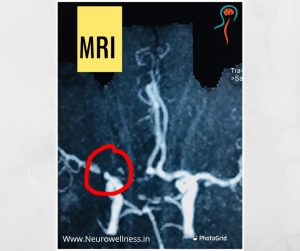
MRI brain stroke protocol showed MCA territory watershed infarcts with right MCA high grade stenosis.
DSA digital subtraction angiogram showing >95% focal stenosis with reduced flow into distal branches of M2M3.
After preparing and explaining benefits and risks we planned for Stenting of MCA.
MCA is a major brain vessel one on each side right and left. When stenting is advised , it is a minimally invasive procedure. There is no need to open the skull no blood loss like routine craniotomy. Small thin wires and tubes little larger than our hair are inserted into the vessel in the thigh and which reaches the brain and where stenting is applied in the narrowed vessel.
In Cath lab, right femoral puncture was done, right femoral sheath was placed . Using guide wires, micro wire and micro catheter right MCA is reached. We did MCA stenting(2.25mmx8 mm) brain vessel.
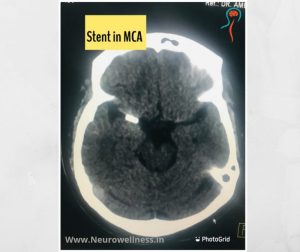
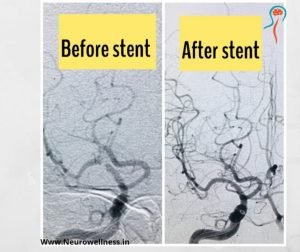
Patient tolerated procedure well.
Picture – showing before and after images
No complications.
Post op CT scan was normal. No Bleeding or stroke.
She was walked next day itself and discharged after 2 days
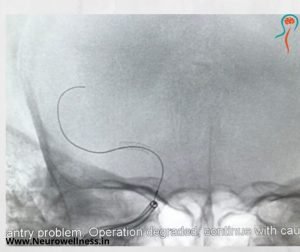
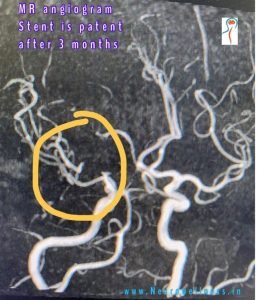
DISCUSSION
A Transient Ischemic Attack (TIA) is a stroke which will reverse in 24 hours with or without any treatment, it is also known as a mini-stroke. It is very important to find out the cause of mini stroke.
Mini stroke is a warning sign of major stroke. In elderly commonly there will be fat accumulated in the vessels(atherosclerotic vessels) in neck and brain there may be significant disturbance in the blood flow into the brain . If there is transient interruption in blood flow there will be momentarily stoppage of brain function and causes ischemia and mini stroke, there will be reversal of stroke after establishment of circulation to brain.
Symptoms of TIA(Mini stroke)
- Facial weakness
- Weakness in limbs
- Speech dysfunctions
- Dizziness.
- Vision dysfunction transiently
- Diagnosis by
- Duplex scan
- CT scan brain
- MRI brain
- MRA angiogram
- ECHO
- Perfusion scan brain.
- DSA
Learning points –
- TIAs will predict the future stroke by 15 %
- TIA are warning sign of major stroke ,which can be prevented by correct treatment .
- About 30 -40 % of people who have TIA can have major stroke within one year
- Interventional Surgery for stroke- MCA stenting, carotid Stenting, mechanical thrombectomy for acute stroke.
This surgery was done in Fortis Hospital, Cunningham Road Bengaluru by
Dr Ganesh Veerabhadraiah – consultant neurosurgeon-brain and spine and team.
E mail- ganeshneuros@gmail.com

